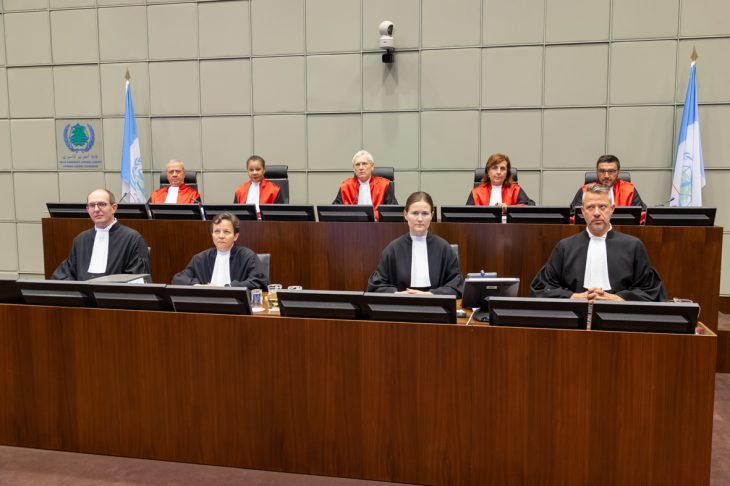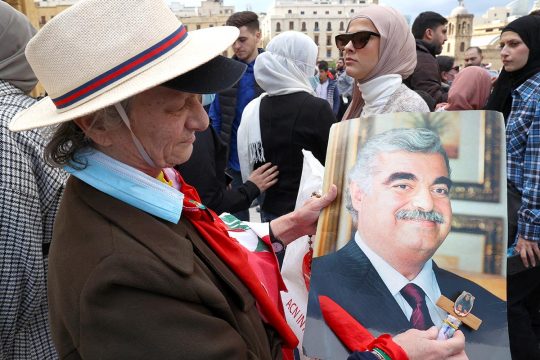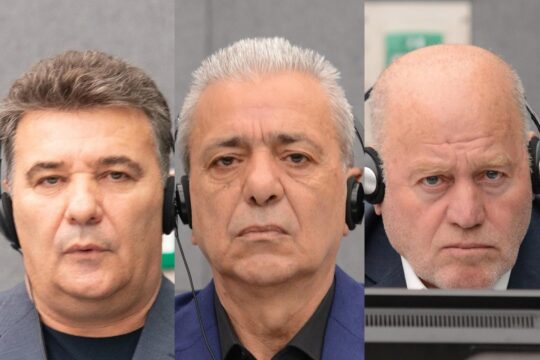The Special Tribunal for Lebanon is rounding up its case against four accused over the 2005 bombing that killed former Lebanese prime minister Rafik Hariri and others. Closing arguments took place in The Hague between September 11 and September 21. But the trial is being held entirely in absentia, a rarity in international law, leading experts to ask if the tribunal is still relevant.
At the start of the closing arguments on September 11 there was a packed courtroom and busy public gallery, but none of the four suspects actually in the dock. In fact, the four defense teams have never spoken to their clients, who remain at large. Salim Jamil Ayyash, Hassan Habib Merhi, Assad Hassan Sabra and Hussein Hassan Oneissi were charged in 2011 with intent to carry out a terrorist attack and four related charges stemming from the massive explosion in downtown Beirut which killed Hariri and more than 20 other people, also wounding more than 200. In 2012, when they had not been arrested or surrendered themselves to the court, the tribunal ruled it could try them in absentia.
No international tribunal since Nuremberg had tried a case in absentia until the “Ayyash et al” case opened at the Lebanon tribunal in 2014. Many international law experts say trials held in the absence of the accused are an infringement of their rights, namely the right to be present at their own trial. It is like “having a boxing match without an opponent,” says Dov Jacobs, assistant professor of law at Leiden University and a member of Laurent Gbagbo’s defence team at the International Criminal Court.
Trapped into Lebanese politics
Legal commentators agree that the biggest problem of having a trial entirely in absentia is the question of legitimacy both internationally and in Lebanon itself, which could affect the legacy of the court.
“It is likely not to be taken seriously by the Lebanese people,” says Karlijn van der Voort, a Dutch international law expert who has followed the Lebanon tribunal closely for several years. “The legacy will thus have less impact and the very obvious inability of the authorities to arrest the outlawed accused could only serve to strengthen their popularity in certain quarters.”
The STL is highly divisive in Lebanon because prosecutors have been outspoken in linking the accused to the Iran-backed Shi’ite Hezbollah movement. Hezbollah, after years of taking a relative backseat in Lebanese politics, is eying a bigger role after a strong showing in May’s parliamentary election. Hezbollah is a vocal opponent of the tribunal, dismissing it as a construct of its enemies, the United States and Israel.
Current prime minister designate Saad Hariri, the son of Rafik Hariri, is a staunch supporter of the tribunal. He showed up on the first day of closing statements and is one of the victims participating in the case. However, in order to form a unity government he cannot afford to alienate Hezbollah.
After prosecutors spent much time highlighting the links of the accused to Hezbollah in their closing remarks, Saad Hariri would not comment. Instead he spoke of putting aside his feelings and any desire for revenge for the good of the country. “There are things that hurt, but when (one is) in a position of responsibility, one has to look at the country’s interest,” he told journalists.
How it may help to lack credibility
What also helps keep political tension down is that for the most part the trial is highly technical and charges are based on mainly circumstantial evidence derived from mobile phone records. Instead of harrowing eyewitness accounts and forensic photographs or videos, most of the prosecution closing statement was a high-speed master class in assessing data gathered by mobile phone operators about their network, its users and their whereabouts, with lots of graphs and maps. The defense, in the absence of defendants, also kept their final remarks quite technical, mainly questioning the reliability of the technical evidence and stressing that the prosecution had only a circumstantial case with no real links to the defendants.
Now that closing statements have been made after a four year trial, the judges will deliberate on their verdict. Paradoxically, the questioned credibility of the tribunal and the very technical nature of the case could actually be a plus for Lebanon. The impact of a verdict could be controversial, but is unlikely to tip the country into chaos as some feared when the court was set up.
“The fact that the indictees were not present and did not have a chance to defend themselves will shed much doubt on the credibility of any decision by the tribunal,” Imad Salamey, associate professor of political science at the Lebanese American University, told JusticeInfo. “That will defuse the political tension in the country,” he said, adding that many political parties have already distanced themselves from the tribunal.
Will the judges play it safe?
Dov Jacobs sees one possibility for the court to cause a stir with the verdict, but it will very much depend on the judges how they see their role. In their closing statement, prosecutors clearly pointed to Hezbollah as the mastermind organization behind the attack, at the same time stressing that the judges did not have to rule on the role of Hezbollah but could look only at the alleged individual responsibilities of the suspects.
If the STL judges decide to go the way of other international courts like those for ex-Yugoslavia and Rwanda, trying to construct a narrative on the story of Lebanon and ruling on the role of Hezbollah, a verdict might not be so easily dismissed by politicians. “Accused or no accused, if a verdict by the tribunal clearly says Hezbollah is making a mess in Lebanon it will have an impact,” Jacobs warns.
Much then depends on how the judges see their role. If the questions they asked the parties during closing arguments are any indication, they are much more focused on the technical aspects of the evidence than the supporting theory of Hezbollah involvement. “The judgement may have minimal impact if the judges play it safe and stay very technical with no allusions to any political dimensions,” says Jacobs.
A date for a verdict has not been set, but it is expected in the first half of next year.







